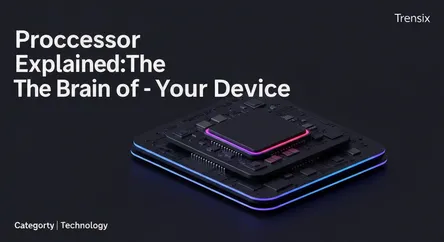Technology
Processor Explained: The Brain of Your Device

What is a processor? Discover the 'brain' of your computer and smartphone, and why new chip advancements are making tech faster than ever.
What is it?
A processor, or Central Processing Unit (CPU), is the core component that acts as the 'brain' for computers, smartphones, and other electronic devices. It interprets and executes most of the commands from the device's hardware and software. By performing billions of calculations per second, the CPU handles everything from opening an app and browsing the web to complex gaming and video editing. It is the fundamental engine that drives the functionality of modern computing.
Why is it trending?
The race for processor dominance is constantly heating up. Companies like Intel, AMD, and Apple are pushing the boundaries of performance and power efficiency. Trends include increasing the number of cores for better multitasking and the development of specialized chips, like Apple's M-series, which integrate graphics and memory for superior performance. Furthermore, the rise of Artificial Intelligence has fueled demand for Neural Processing Units (NPUs) built directly into CPUs to accelerate machine learning tasks on-device.
How does it affect people?
Processor advancements have a direct impact on user experience. A more powerful CPU means faster application loading, smoother multitasking, and the ability to run demanding software and games. For portable gadgets like laptops and phones, improved processor efficiency leads to significantly longer battery life. This continuous innovation enables new capabilities, from real-time language translation and advanced photo editing powered by AI to more immersive virtual reality experiences, fundamentally changing how we interact with technology.